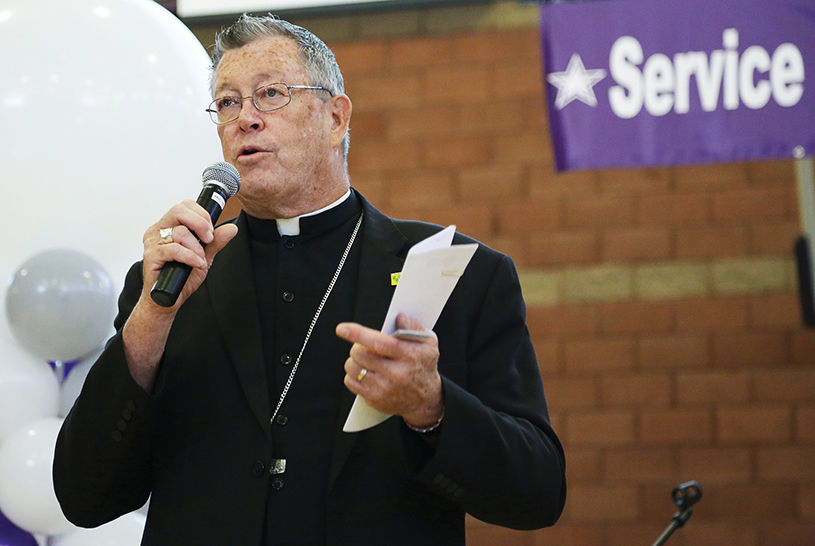Auxiliary Bishop Edward W. Clark has served the Church as a parish priest, school principal, theology professor, and president and rector of St. John’s Seminary. After more than 40 years since his ordination in 1972, his commitment to service continues.
His coat of arms bears his life’s motto, “The gift received give as a gift.” The maxim refers to the Gospel of Matthew, Bishop Clark told The Tidings. “Freely you have received; freely give” (Matthew 10:8).
St. Thomas Aquinas best expressed the Church’s teachings on charisms, which are one or more talents given to a person at baptism, says Bishop Clark, bishop of Our Lady of the Angels pastoral region, adding that a Christian upbringing should include learning about these gifts.
Bishop Clark says that God asks us to freely give of our talents.
“Gifts that are given not for the sanctification of the individual but for the service of the Church,” he says. “St. Paul’s understanding is that the Church won’t be fully alive until everyone uses their charism to make up the Church and advance the kingdom of God.”
Bishop Clark’s main charisms are teaching and administration.
“I was always drawn to teaching and was effective in teaching the faith,” he says. Bishop Clark began teaching full-time as a professor in 1999, before serving as president and rector of Saint John’s Seminary College from 1994 to 2001.
“I think the years I spent in the seminary were the best years, the happiest years,” he says of teaching. He has since become professor emeritus at the seminary.
He enjoyed his time at the seminary but he says, “People who can administrate should administrate,” adding, “I think I have that charism.” Among his many duties as a regional bishop, Bishop Clark chairs the education committees of the California Conference of Catholic Bishops.
Also close to his heart is enabling different cultures to work together. His region of Our Lady of the Angels Pastoral Region boasts many cultural heritages.
For over a decade, Bishop Clark has worked to build understanding and openness between cultures by meeting regularly with a counsel of representatives from each ethnic group in the region.
“We are really a diocese of multiple minorities, so how we function together is very important,” he says.
Each year, he also sends out a Christmas card that represents a different ethnicity found in his region. “So everyone who gets my card is aware of the various cultures,” he says.
A long time liaison for California’s Native American communities, Bishop Clark has been appointed to review and revise the cultural content of the California Church Missions.
The ambitious 18-month review, announced this week, hopes to engage an open and respectful dialogue with local Native American tribes and aims to present an accurate representation of the Mission Era and the effect it had on Native American cultures.
The history of the missions and the Native Americans, he says, “Is not the romanticized version we used to have in grade school.” But it still doesn’t “take into account the uniqueness of the Native Americans who built each of the missions.”
The eldest of four children, Bishop Clark said he became a priest thanks to the good influence of the seminarians at his grade school. Bishop Clark was born in Minneapolis, Minnesota, and has lived in Idaho and Orange County, California.
After completing his master’s in religion at St. John’s in 1968, Bishop Clark went on to receive a licentiate in fundamental theology in 1986 and a doctoral degree in theology in 1988.
In 2001, he was ordained an auxiliary bishop under Cardinal Roger Mahony.
Commenting on the upcoming ordination of Bishops Joseph V. Brennan, David G. O’Connell and Robert Barron, Bishop Clark says, “The only thing I can say besides wishing them well is that [the archdiocese] has a very collaborative approach — all three of them are going to be running regions — so we’ll be working very closely with them and obviously helping them as they learn to be regional bishops.”
When he first began as a bishop, Bishop Clark says he often asked advice from more experienced bishops. “I hope they feel comfortable calling me for advice or whatever — I’m certainly willing to give it,” he says, laughing.

